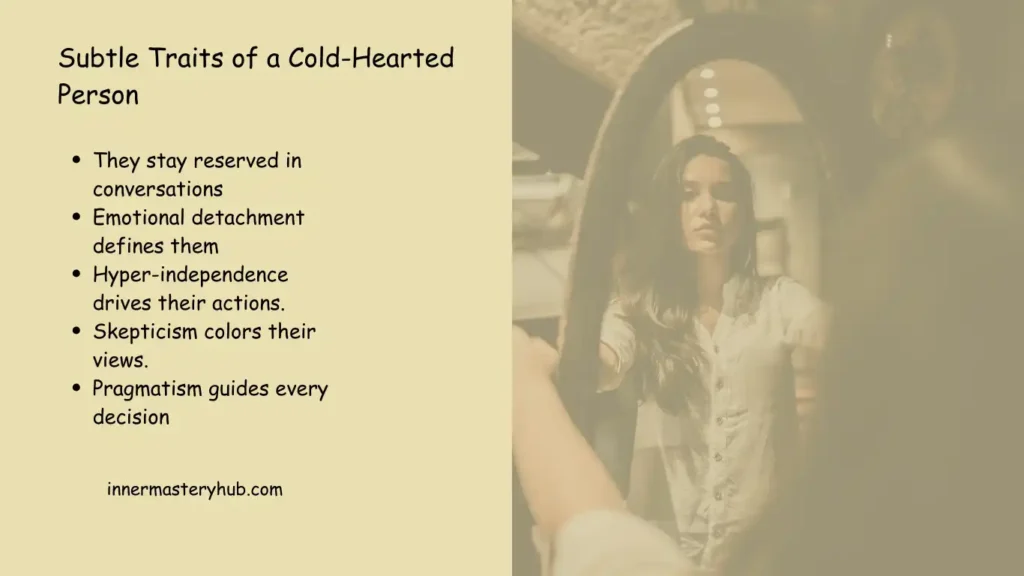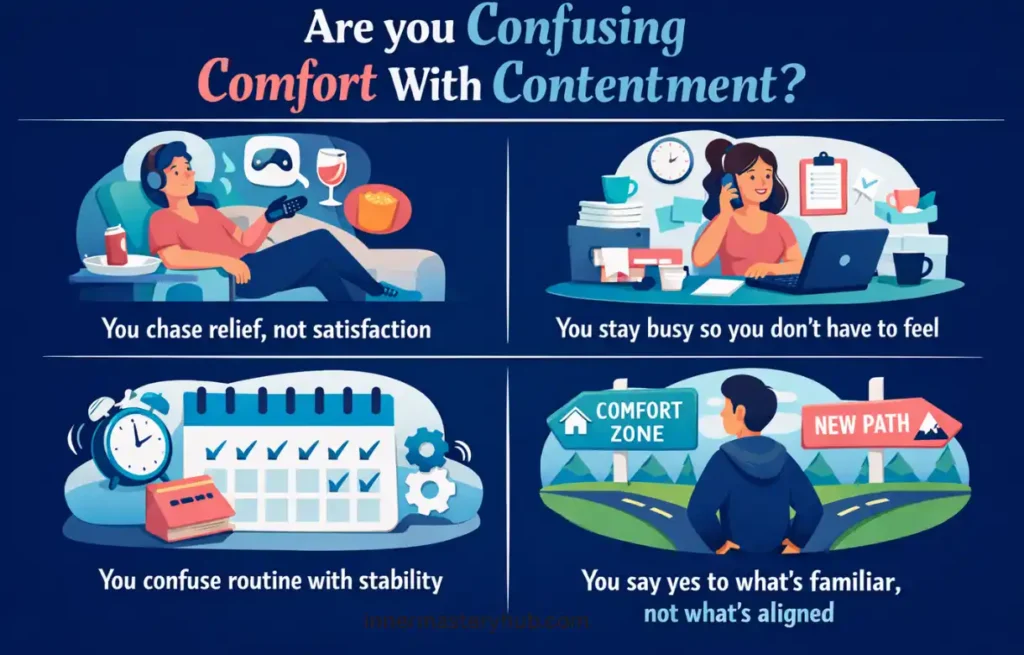8 Traits of Cold-Hearted People: Turning Pain into Wisdom

We meet cold-hearted people more often than we realize. They leave us feeling lost and sap energy from relationships. I’ve encountered some of these issues in my personal life and in business over the years. It is challenging to communicate with these individuals because they often lack fundamental warmth and empathy.
According to psychology, one of the leading indicators of cold-hearted people is emotional detachment. According to research from a meta-analysis of Dark Triad qualities, such as psychopathy and narcissism, such people often have poor empathy scores. If you observe more closely, you might pick up on tiny signals earlier. These indicators and self-defense techniques are covered in this article.
What Is a Cold-Hearted Person?
People often perceive cold-hearted individuals as detached and emotionless. They distance themselves from committed relationships. Studies on empathy issues link this behavior to alexithymia, emotional insensitivity. Early experiences, such as uneven parenting and avoidant attachment, may lead people to become cold-hearted.
John Bowlby and Mary Ainsworth developed attachment theory in the 1950s and 1960s to explain how untrustworthy caregivers teach children to suppress emotions for self-defense. These adults still consider vulnerability weak. Although strong, their independence conceals an inability to form meaningful connections. They upset friends, lovers, and families with their coldness. Logical over emotional is great until it makes you feel alone.
Possible Causes of Being a Cold-Hearted Person
Experiences shape cold-hearted people more than genes. Childhood trauma generally dominates. A landmark CDC and Kaiser Permanente study in the late 1990s found that children who were neglected or abused are more likely to become emotionally numb as adults. My friend learnt to suppress his feelings because his family punished them.
In twin studies, the Dark Triad—narcissism, Machiavellianism, and psychopathy—has 40-60% heritability. Chronic stress and betrayals harden hearts. The Journal of Neuroscience revealed that continuous stress affects empathy-related brain regions, including the anterior insula.
Stoicism is valued in some cultures, fostering qualities such as coldness in competitive sectors like commerce and law. These factors create a loop in which cold-hearted people avoid connections to avoid suffering, deepening their isolation. Knowing roots helps you respond without taking their actions personally, but it does not excuse their harm.
21 Subtle Traits of a Cold-Hearted Person, According to Psychology
Cold-hearted persons show identifiable psychological patterns. Their actions show separation. Robert Hare, developer of the Psychopathy Checklist-Revised (PCL-R), says low empathy scores indicate manipulative tendencies. My experiences and study inform these 21 subtle signals. These features suggest an emotionally detached person.
- When speaking, they remain quiet. To avoid being vulnerable, cold-hearted individuals keep their conversations superficial and refrain from revealing anything about themselves.
- They are defined by emotional detachment. As if emotions don’t exist, they respond very little to the happiness or grief of others.
- Their activities are motivated by hyper-independence. They reject assistance because they believe that dependence on others is a weakness that results from a lack of trust.
- Their opinions are tainted by skepticism. They assume hidden motivations in seemingly innocuous gestures and are constantly questioning motives.
- They are easily criticized. Their unbalanced criticism of others undermines their confidence.
- An air of intimidation surrounds them. Their aloof manner makes things challenging and discourages intimacy.
- Every choice is made with pragmatism in mind. They disregard how their decisions impact others and prioritize results over relationships.
- Talking about vulnerability scares them away. When conversations become personal, they either shift the topic or leave.
- Intimate interactions challenge them. They often struggle with commitment and tend to end relationships quickly.
- Their mindset is locked in by stubbornness. They reject new concepts and hold onto their opinions in the face of facts.
- Unrealistic expectations burden others. They offer minimal support and expect perfection.
- The use of toxic coping techniques is everyday. Instead of using constructive channels, they turn to blaming or seclusion.
- Detachment and distance exist. Even in long-term relationships, emotional walls often remain.
- Superiority shows itself subtly. They behave as though their concerns are more important than those of others.
- The dominant focus is self-centered. Their needs are the focus of conversations, not yours.
- Over time, untrustworthiness becomes apparent. When it suits them, they break their word.
- Independence depends on loneliness. They reject community and manage things alone.
- Infrequent apologies mark their style. They place the blame elsewhere rather than taking responsibility for their mistakes.
- Control becomes a routine. To keep their position of authority, they set the terms for conversations.
- Without regret, betrayal occurs. If it helps them, they hurt others without remorse.
- Repeat violations go unpunished. They act hurtfully again and fail to learn from the consequences.
These signals from the Big Five personality traits, where low agreeableness is associated with coldness, help you spot patterns early. I’ve found that a group of these indicates difficulty.
Behaviors Associated with Being Cold-Hearted
Cold-hearted persons act accordingly to their inner state. Machiavellianism research shows that high scorers deceive to their advantage. I worked with someone who lied to be promoted, undermining coworkers. Hare found that psychotic people lie easily.

Self-centeredness often leads people to interrupt or dominate conversations. In a study linking poor empathy to recklessness, individuals take risks without considering the consequences. Sustaining power by denying truth is gaslighting. They look for favored treatment out of entitlement. They conceal their motives, making trust hard. Toxic dynamics deplete energy from the people involved.
Attitudes Associated with Being Cold-Hearted
Cold-hearted persons have a self-centered mindset. Their view of emotions as weaknesses has its roots in evolutionary psychology, where detachment helps resist difficult conditions. They ignore others’ opinions because of their Superiority.
Cynicism leads them to assume the worst, according to research linking low empathy to poor social standards. They expect benefits without reciprocation. Their hidden hostility spills in subtle insults. Neuroscience research on diminished insula activity shows that their pain reaction is indifference; these attitudes promote isolation by preventing actual connections.
Thoughts and Struggles Associated with Being Cold-Hearted
Cold-hearted people have hidden issues. They often choose rationality over emotions, which can complicate life. Empathy research suggests that loneliness usually stems from relationship challenges. They briefly battle guilt but conceal it, and then they become bored without passion.
Their Superiority hides past wounds’ vulnerability. Someone I knew blamed their hurts on others’ oversensitivity, avoiding self-reflection. These thoughts lock them in patterns, preventing growth.
Emotions Associated with Being Cold-Hearted
Alexithymia studies show that individuals who struggle to understand their feelings tend to become annoyed by empathy. Independent pride trumps warmth. Poor sleep reduces compassion, reducing empathy, according to a study. They ignore relationship costs and enjoy rewards. Their limited emotions keep them detached, yet limit fulfillment.
Facial Expressions Associated with Being Cold-Hearted
Facial expressions reveal heartless people. They avoid warm-looking smiles and instead keep a harsh or neutral expression. Eyes are dull and seem far away.
During emotional conversations, frowns prevail. Their low empathy is linked to flat effects, according to research on nonverbal communication. Interactions feel impersonal due to these expressions, which reinforce barriers.
Body Language Associated with Being Cold-Hearted
Body language conveys a lot. Cold-hearted people put up physical barriers by crossing their arms. They show disengagement by avoiding eye contact. Aversion is demonstrated when one leans away during a conversation.
Psychopathic features are linked to broader desires for personal space in studies on interpersonal distance. Strong postures communicate control. These indicators point to emotional instability.
The Impact of Cold-Hearted People on Your Life
Cold-hearted people cause long-term harm. They reduce trust, forcing you to doubt your connections. Anxiety or despair are the result of emotional exhaustion. A study found that being around people who have less empathy raises cortisol levels.
In my instance, a friendship left me questioning my worth after several rejections. Work surroundings become poisonous, limiting productivity. Marriage fails, creating wounds that prevent future connection. Family relationships degrade, producing patterns that span generations. These effects accumulate, transforming minor interactions into significant tensions.
You start to question yourself, wondering if their coldness reflects your weaknesses. Isolation develops gradually as you withdraw to avoid suffering. The irritation rises as you know that their actions come from fundamental issues, but they refuse to change, locking you in a cycle of hope and disappointment. During this time of chaos, it is essential to prioritize protecting one’s mental state.
How Do You Deal With a Cold-Hearted Person?
It takes strategy to deal. Set limits on access early on. Be explicit about your needs, but be prepared for resistance. Ask sympathetic friends for assistance. Therapy helps in the impact process. To keep the peace, keep a distance.
4 Effective Ways to Deal with Them
- Quickly identify patterns, to prevent denial, and monitor the signals.
- Make self-care a top priority, and engage in activities that help restore your self-esteem.
- Keep interactions to a minimum; if necessary, use formal channels of communication.
- When you can, leave. According to research, breaking off unhealthy relationships can increase overall well-being.
Final Thoughts on Someone With a Cold Heart
Cold-hearted people challenge us, but knowledge empowers us to protect ourselves. Focus on your growth, surrounding yourself with warmth. Change happens when you choose boundaries over endurance.
Frequently Asked Questions about Cold-Hearted People
What are the signs of a cold-hearted person?
Cold-hearted individuals often exhibit emotional detachment, lack empathy, and prioritize their own interests above those of others. They control others without regret, avoid showing vulnerability, and give harsh criticism. Studies on low agreeableness features in psychology have shown that individuals with this trait tend to exhibit guarded behavior, a lack of concern for others’ pain, and shallow interactions.
Why do people become cold-hearted?
Childhood attachment problems, prolonged stress, or past trauma might cause people to become cold-hearted. In addition, genetics and repeated betrayals lead to emotional numbness as a protective mechanism. Early neglect is linked to lasting empathy deficiencies, according to research on traumatic childhood experiences.
How to deal with cold-hearted people?
To safeguard your emotional well-being, prioritize self-care, establish clear boundaries, and limit your interactions. Be assertive in your communication without expecting immediate change, and consider seeking therapy or consulting with sympathetic friends for support. By detecting their habits early on, you can protect your mental health and prevent exploitation.
What makes someone cold-hearted?
Trauma, heredity, or contextual factors such as inconsistent parenting can all contribute to cold-hearted tendencies. Long-term stress changes the parts of the brain involved in empathy, whereas cultural pressures push detachment.
Can cold-hearted people change?
Individuals with a cold-hearted nature can develop empathy through practices such as mindfulness or therapy. Facing implications and engaging in self-reflection drives improvement, yet it’s rare without genuine desire. According to attachment theory, relationships become warmer when underlying concerns are addressed; however, change requires vulnerability, which people sometimes resist.
How to spot a cold-hearted person early?
Be mindful of subtle indicators such as quick criticism, avoiding in-depth conversations, and emotional flatness. They are distant, seldom offer an apology, and don’t seem to care about the suffering of others. Before a more profound connection, early conversational patterns that show self-focus and a lack of reciprocity can help you detach.
Are cold-hearted people aware of their behavior?
Many cold-hearted people, who suffer from alexithymia, a disorder that affects the ability to recognize emotions, explain their detachment as strength without realizing the consequences. A lack of self-awareness in these features, often resulting from repressed emotions, renders confrontation ineffective without expert assistance, according to psychological studies.
What are the effects of being around cold-hearted people?
Due to repeated rejection, exposure damages trust, increases anxiety, and reduces self-esteem. Studies have shown a correlation between increased cortisol levels and toxic relationships, which result in emotional exhaustion and social isolation. Your general well-being and future relationships may suffer if you start acting defensively over time.
How do cold-hearted people behave in relationships?
They tend to avoid commitment, fight for control, and maintain a distance in their relationships. They gaslight their partners, disregard their needs, and break relationships suddenly and without remorse. Others feel confused and unappreciated as a result of this imbalance, which is visible in narcissistic abuse patterns.
Is being cold-hearted a personality disorder?
In some instances, it is similar to narcissistic personality disorder or antisocial personality disorder. Characteristics like a lack of empathy, which are often inherited or trauma-related, meet DSM-5 criteria. However, some issues are situational rather than pathological, and treatment can help identify and address underlying problems.






